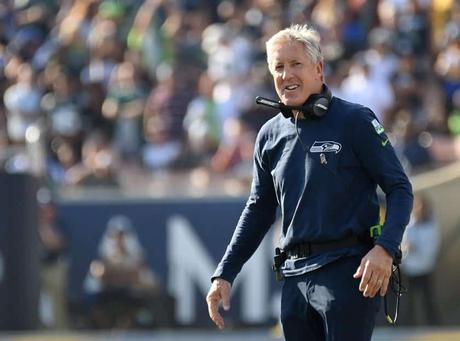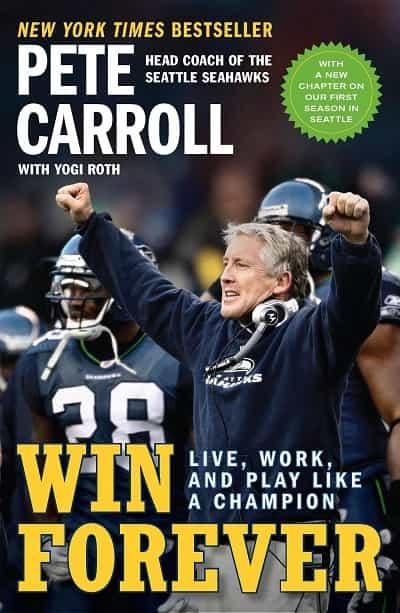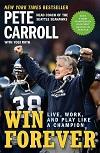 UPI / Alamy Stock Photo
UPI / Alamy Stock Photo
Pete Carroll is the head coach of the NFL’s Seattle Seahawks. Carroll is one of just of three head coaches who have won a college football national championship (2003 and 2004) and a Super Bowl (2014).
His book, Win Forever: Live, Work, and Play Like a Champion, is the background to his coaching philosophy, which is rooted in relentless competition. By competing with yourself to the maximum each time you step onto the field, into the classroom, or into the weight room, you are winning forever.
Carroll mixes stories and anecdotes from his playing and coaching career. He details how he came to land on his coaching philosophy. And he touches on the awesomeness that has happened since then, including two NCAA titles as head coach of the USC Trojans and a Super Bowl with the Seattle Seahawks.
Below are some quotes and key passages from Win Forever. I have also included some of my own thoughts and notes.

Paperback (Amazon) | Kindle
Building a philosophy is not easy, but it’s worth it.
Carroll had been coaching for decades before he sat down and put in the effort and time required to come up with a coaching philosophy that was unique to him and his strengths.
- “The process was long and difficult, but the more I wrote, the more powerful the experience became.”
- “I realized at the core of my being, I was a competitor… With this understanding, I set about structuring a football program strictly based upon my core belief.”
Build a philosophy around your core belief.
Once the lodestar of his philosophy had been decided upon, Carroll used this central and core belief to inform the practices, the mindset, the very nature of the team and program.
- “Competition would become the central theme of the program, and our day-to-day thinking would be driven by this single though: to do things better than they had ever been done before.”
It’s You vs. You
Although sport and business is played against competitors, how we perform is ultimately a measure of how we compete with ourselves. Focusing on others creates uncertainty. But competing against yourself—you can always control that.
- “The only competition that matters is the one that takes place within yourself. It isn’t about external factors.”
- “Physically, when we doubt our ability, we will tend to overtighten our muscles. Mentally, we fear failure and can become emotional and distracted.”
- “The best performers, whether athletes, entertainers, or anybody else trying to do anything well, are the ones who aren’t trying to win by playing someone else’s game.”
- “As a coach working to build confidence, you have to convince your players that not only do they have the power to control their performance, but they’re the only ones who do.”
Clear your mind, open your potential.
Athletes perform at their best when they are clear of mind. A clear or quiet mind is optimal because you stay loose and are more likely to find yourself in “the zone,” that mysterious, ephemeral frame of mind where mastery and epic performances happen.
- “This attentiveness, also known as a quieted mind, clears the way for athletes to perform to their highest potential.”
Plan for contingencies.
One of Carroll’s mentors was the late Bill Walsh, the man who took over the floundering 49ers in 1979 and turned them into Super Bowl champions within three years. (The 49ers would collect four more Super Bowls over the next dozen years.)
Walsh’s philosophy, distilled in his excellent leadership book, The Score Takes Care of Itself, discusses the critical nature of planning as thoroughly as possible. This was something Walsh imparted on Carroll.
- “His approach was that preparation and practice sessions should be designed so that the performer is trained for all potential outcomes and events.”
- “When you plan and train for all possible contingencies, you eliminate surprises and, in turn, eliminate a huge source of doubt that so often makes us tighten up.”
You can only be you.
All too often we get lost in what others are doing. We try to imitate the plans and results of others but end up performing at a mediocre level while performing inauthentically.
Embrace who you are, what your strengths are, your interests, and maximize the things you know and do well. You can only be yourself. Leaders are authentic to themselves in everything they do.
- “If I began to try to please others by changing, I would be miserable.”
Leaders create opportunities for success.
One of the roles of a good coach or leader is to design opportunities for team members and athletes to be successful. Success breeds confidence and a deeper belief in one’s self, creating a positive upward cycle of change and improvement.
Carroll worked diligently with one of his quarterbacks when he was coaching in New England to bolster what remaining confidence the player had.
- “We worked hard with Jimmy, and as part of our process we made sure we engineered opportunities that helped him succeed.”
“Practice is everything”
Although competing like a champion is Carroll’s central theme, “competition” applies equally to training and practice. After all, no matter how great a competitor you are on game day, the ceiling of your ability is determined by what you are doing in practice.
- “How we practice defines who we are.”
- “It is not only something we have to do in order to compete, but our practice is a competitive activity in and of itself.”
- “A player who is fully prepared on the practice field will feel ready to meet whatever comes his way on game day and thus, feel more confident and able to minimize distractions of fear or doubt.”
No complaining.
Carroll’s philosophy included three simple rules that would help govern the mindset and behavior of his athletes. Among them was no complaining. The language we use with ourselves influences our behavior and actions.
Research has found that if you tell yourself a hard workout is going to really hurt, you are going to be more sore than if you tell yourself it’s going to be hard but you are up to the challenge.
- “I strongly believe in the power of intentions and wanted everyone in the program to speak in the affirmative.”
- “Whereas a negative mentality attracts negative thoughts, a positive approach creates the power of possibilities.”
- “What you expect is usually what you get.”
Effort is the barometer of success.
During practices, assistant coaches were told to stay on top of the effort of athletes during drills and scrimmages. Results were secondary; effort was the priority. This usually meant matching up players of similar ability to insure that they would go all-out.
- “One of the reminders for our coaches was to ‘critique effort first.’”
- “Put them in actual situations where they must ”
- “There are no choices: you’re either competing or you’re not!”
Maintain an element of surprise and curiosity.
High-level coaches are excellent at keeping things fresh and interesting for athletes.
Phil Jackson, the legendary Bulls and Lakers coach and winner of an unprecedented 11 NBA championships, made a point to keep workouts fresh to keep his players engaged.
Although Carroll was very serious about the work they were doing, he made a point to keep it fun and engaging.
- “Part of our job as teachers is to entertain and surprise our students. Remember, the idea is to keep them fascinated with what’s going on, so they keep coming back, wondering what will happen next.”
Prepare so that you don’t fear the game.
Preparation cuts down on a lot of the pre-competition anxiety that happens with athletes. When you’ve run the route 500 times in practice, doing it once in a game doesn’t seem so challenging.
- “I’ve learned that possibly the greatest detractor from high performance is fear: fear that you are not prepared, fear that you are in over your head, fear that you are not worthy, and ultimately, fear of failure. If you can eliminate that fear—not through arrogance or just wishing difficulties away, but through hard work and preparation, you will put yourself in an incredibly powerful position to take on the challenges you face.”
Set high expectations.
One of the jobs as a coach and leader is to show how capable an athlete is. To help them manage some of the imposter syndrome and fear of failure that is inherent when trying to make progress, improve, and compete.
Of course, this doesn’t mean creating expectations that are unrealistic or fly in the face of the athlete’s skills, talent, and preparation.
- “More often than not, people will live up to the expectations you set for them, and when it comes to our players, we set those expectations extremely high from their first day in the program.”
- “If those expectations are unrealistic… we are just setting up our players to fail.”
Learn from your mistakes…
But avoid the urge to dwell on them. Because no matter how much you fixate on them, not matter how much you want to beat yourself up for a bad loss or a big mistakes, it’s wasted energy and focus.
- “We never dragged the past along with us, because the past is not a place where we can compete.”

Paperback (Amazon) | Kindle
More Resources:
Lead Like a Champion: 5 Must-Read Books for Coaches. These are my favorite five books for coaches and leaders from some of the top coaching minds on the planet.
Check out this list of my favorite mental toughness books for athletes.
